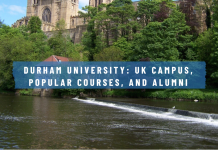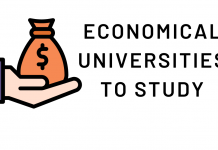Study Abroad Made Easy Part 2, Study Abroad Made Easy Preparation Tips, Study Abroad Made Easy Preparation Material
Be Wise, Choose Right!
Once decided to go abroad for higher studies, students face a lot of confusion about choosing the course, country and university. Following up our introductory blog (Part 1) of the Study Abroad Made Easy series, the current article will recapitulate the decision making process associated with the overseas education.
Check Here: Study Abroad Made Easy Complete Guide
Choosing The Right Course or Discipline: While choosing the course, do think about about two factors – your interests (what makes you happy or make you feel passionate) and your career goal (what do you want to do in life). You don’t need to know the exact answers, especially if you are planning to go abroad for your undergraduate studies. There are people in mid-30’s who still don’t know what interest them and what they want to do in life. What you need to do is choosing a relevant course that ticks those two important boxes. It is also important to talk to your parents, teachers and education counsellors.

In most cases, your parents will be paying for your studies abroad. But, that does not mean you have to follow everything they say to you. It might be possible that you want to pursue a research career, while your parents want you to go for MBA because your Dad’s colleague told him “Bhaisaab MBA mein aagey jaake bahut scope hai” and/or your Mother told you “Sharmaji ke bete US mein MBA kar raha hai”. It is important that you know what you want and you follow that path. Don’t be afraid to choose an off-beat streams like energy & waste management, anthropology, sports science, event management, creative writing, public relations, game design or forensic chemistry.
Choosing The Country and University:It might be possible that your Uncle and his family are settled in Canada, your best friend is planning to go to Australia or your Father (and forefathers) have gone to UK for higher studies. The same thing goes about the university. It is wise to https://www.meetuniv.com/ at least 3 – 5 universities where you want to study, and apply to them. Do not be biased against location I want to study in UK only. Do not be biased against rankings and big names – Harvard, MIT, Oxford, Cambridge. Think about the course content and modules, infrastructure, research impact, industry links, faculty members and their credentials. It is quite possible that a University that ranks falls outside the top 40, but the course that you have decided is being offered by the Department that falls within the top 10.
You can help yourself in the process by meeting the university representatives and/or alumni at education fairs. If something is not happening in your town or city, you can talk to them through webinars and virtual sessions. Last but not the least, abroad education counsellors are always there to advise you. You should also possess information if you are talking to a university agent, education consultant or a counsellor belonging to an education company or trusted university search platforms. University agents would be a little biased towards promoting their own universities. Counsellors of abroad education companies will have tie ups with universities, but generally with more than one or two universities. Abroad education consultants and university portals would be logical as they might be having contracts with more than 20 universities in a single country. That will ensure you end up at the best possible place. Education consultants would be the best persons to give you unbiased advice. But, they do charge a fees for their consultation. Talk to as many people as possible, and make the final decision yourself.
Return on Investment: You also need to consider the value for money while deciding the university, especially for MBA aspirants. Ending up in a top B-School in the US or Australia might lead to a six figure salary, but that will also lead to a huge debt, unless you are being sponsored by your employer or you are born with a silver spoon. If you have got a decent undergraduate degree with solid 2 – 4 years experience, you can look beyond the FT rankings and Ivy league schools. If you are a fresh B.Tech pass out (or with less than 1/2 year of work experience), going got MS/M.Sc. In Engineering Management will be wiser than going for MBA.
Study Abroad Destinations: The destinations could be categorized as follows:
-
Traditional (Classical) and Popular destinations like US, UK, Australia, New Zealand, Germany, Canada, Singapore – these are the ones that offer all kinds of courses for everyone, and popular since ages.
-
New-Age, Emerging and Specialized destinations like Netherlands (Holland), Korea, Poland, Japan, Denmark, Sweden, Norway, Caribbean, South Africa, Switzerland, Italy, France etc. The specialties of these destinations will be discussed during our Webinar on Study Abroad.
That is it for our Part 2 of the Study Abroad Made Easy series. The Part 3 will cover the application process.
Check Here Study Abroad Made Easy Part 3




















































